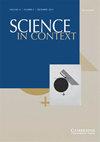‘The Vibrant, Passionate Human Soul He Was’: Robert Haven Schauffler’s The Unknown Brahms (1933) and the American Middlebrow
IF 0.5
4区 哲学
Q2 Arts and Humanities
引用次数: 0
Abstract
Written to mark the centenary of Brahms’s birth in 1933, Robert Haven Schauffler’s The Unknown Brahms (1933) was received rapturously by many American critics as a work which had humanised Brahms to a public that had perceived the composer as mysterious, contradictory, and unrelatable. Today, however, Schauffler’s book is regarded as a readable but unreliable work of popular psychology based not on serious research, but hearsay and rumour. Given its faults, why was The Unknown Brahms met with such acclaim by American critics? This article analyses the book’s early reception to explain its public success. Interpreting a range of reviews published in large-circulation newspapers, I situate The Unknown Brahms’s reception within the discursive context of the middlebrow, to which musicologists have devoted increasing attention in recent years. I also point to the prominence of popular psychology in interwar American society and its importance to a new paradigm of humanistic biography. I argue principally that The Unknown Brahms engrossed middlebrow readers and critics because it was an effective work of music appreciation which allowed lay listeners to engage empathetically with Brahms’s music. By contributing a new case study of Brahms’s American reception, the article broadens understandings of Brahms’s cultural status in the twentieth century.“他是充满活力和激情的人类灵魂”:罗伯特·海文·肖夫勒的《无名的勃拉姆斯》(1933)和《美国中产阶级》
1933年,罗伯特·海文·肖夫勒为纪念勃拉姆斯诞辰100周年而创作的《未知的勃拉姆斯》(1933)受到了许多美国评论家的热烈欢迎,他们认为这部作品使勃拉姆斯在公众眼中变得人性化,而公众一直认为这位作曲家是神秘的、矛盾的、不相关的。然而,今天,Schauffler的书被认为是一本可读但不可靠的大众心理学著作,它的基础不是严肃的研究,而是道听途说和谣言。考虑到《未知的勃拉姆斯》的缺点,为什么它会受到美国评论家的如此好评?本文分析了该书的早期反响,以解释其在公众中的成功。通过解读大发行量报纸上发表的一系列评论,我将《未知的勃拉姆斯》的接受情况置于近年来音乐学家越来越关注的中产阶级的话语背景中。我还指出了大众心理学在两次世界大战之间的美国社会中的突出地位,以及它对人文主义传记新范式的重要性。我主要认为《未知的勃拉姆斯》吸引了中产阶级读者和评论家,因为它是一部有效的音乐欣赏作品,它允许外行听众同情地参与勃拉姆斯的音乐。本文通过对勃拉姆斯在美国的接受提供一个新的案例研究,拓宽了对勃拉姆斯在20世纪的文化地位的理解。
本文章由计算机程序翻译,如有差异,请以英文原文为准。
求助全文
约1分钟内获得全文
求助全文
来源期刊

Science in Context
综合性期刊-科学史与科学哲学
CiteScore
0.80
自引率
0.00%
发文量
1
审稿时长
>12 weeks
期刊介绍:
Science in Context is an international journal edited at The Cohn Institute for the History and Philosophy of Science and Ideas, Tel Aviv University, with the support of the Van Leer Jerusalem Institute. It is devoted to the study of the sciences from the points of view of comparative epistemology and historical sociology of scientific knowledge. The journal is committed to an interdisciplinary approach to the study of science and its cultural development - it does not segregate considerations drawn from history, philosophy and sociology. Controversies within scientific knowledge and debates about methodology are presented in their contexts.
 求助内容:
求助内容: 应助结果提醒方式:
应助结果提醒方式:


